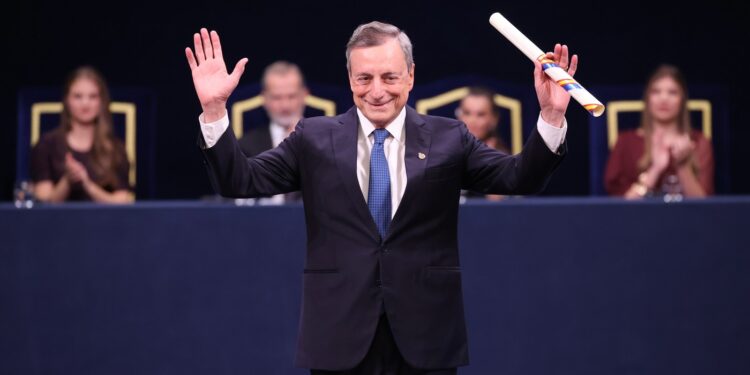Eduardo González
Former Italian Prime Minister and former President of the European Central Bank, Mario Draghi, defended this Friday, after receiving the 2024 Princess of Asturias Award for International Cooperation in Oviedo, a “pragmatic federalism” for Europe “based on concrete issues, flexible, and capable of acting outside the slower EU decision-making mechanisms” and in which “all those who wanted to join could do so, while those who tried to block progress could no longer hold others back.”
“The outlook for Europe is the most difficult I can remember. Almost all the principles on which the Union was founded are under strain,” Draghi said in his speech after receiving the award from Princess Leonor.
“We built our prosperity on openness and multilateralism, but now we are faced with protectionism and unilateral action. We believed that diplomacy could be the foundation of our security, yet we are now witnessing the return of hard military power. We promised leadership on climate responsibility, but now we see some retreating while we bear the mounting costs,” he continued.
“The world around us has fundamentally changed, and Europe is struggling to respond. This raises a critical question: why can’t we change?” Draghi continued. “We are often told that Europe is forged in crises. But how acute does a crisis have to be for our leaders to come together and find the political will to act?” he asked.
“After the great financial crisis and the sovereign debt crisis, the European Central Bank, also thanks to its European mandate, evolved into a more federal institution, and thus the banking union was launched,” the former president of the institution recalled. “Such challenges affect areas such as defense, energy security, and cutting-edge technologies that require shared investment and must be addressed at a continental level,” he warned. Furthermore, he stated, “in some of these fields—especially defense and foreign policy—greater democratic legitimacy is needed.”
“Our governance has not changed for many years. Today, we are a European confederation that simply cannot meet such demands” and that “leaves responsibilities in national hands, powers that can no longer be exercised effectively at such a level. And even if we would like to transfer more powers to Europe, that model does not offer us the democratic legitimacy to do so,” the Italian leader asserted.
“This situation,” he warned, “is not solely due to the legal limitations of the EU Treaties. The biggest obstacle is that, in the face of this new world, we have not built a shared mandate—supported by citizens—for what we, as Europeans, intend to achieve together.”
Therefore, he declared, “beyond declarations, and out of necessity, the future of Europe must be a journey towards federalism, but, as desirable as a true federation would be, it would require political conditions that do not exist today, and the challenges we face are too urgent to wait for them to emerge.”
“Therefore, a new pragmatic federalism is the only viable path,” Draghi affirmed. “This is a federalism based on concrete issues, flexible and capable of acting outside the slower decision-making mechanisms of the EU” and that “would be built through coalitions of willing people around shared strategic interests, recognizing that the diverse strengths that exist in Europe do not require all countries to advance at the same pace,” he added.
“Let’s imagine countries with strong technology sectors agreeing on a common regime that allows their companies to scale rapidly, nations with advanced defense industries pooling R&D efforts and funding joint procurement, and industrial leaders jointly investing in critical sectors like semiconductors or network infrastructure that reduces energy costs,” he explained.
“This pragmatic federalism would allow those with greater ambitions to act with the speed, scale, and intensity of other global powers. Just as importantly, it could help renew Europe’s own democratic momentum,” he said.
“Because opting in would require national governments to secure democratic support for specific shared goals, it would become a bottom-up, not a top-down, building of a common purpose,” and in that way, “all those who wanted to join could do so, while those trying to block progress could no longer hold others back,” he continued. “This is the vision we must offer if Europe is to renew itself,” he concluded.
The King and Princess of Asturias
Previously, the King highlighted in his speech “Mario Draghi’s dedication to progress and consensus, especially in Europe,” in a world “that struggles—too often—between two equally disturbing extremes”: on the one hand, a “radical individualism, which—if not somehow reined in—can lead to both indifference and loneliness” and, on the other, “a globalizing drive that homogenizes everything, that obscures differences and singularities; that degrades diversity, and does so in favor of herd behaviors, often subject to the dictates—subtle but persistent—of a network, an algorithm, a screen.”
For her part, Princess Leonor recalled a quote Draghi made in 2012, when he was President of the European Central Bank: “We will do whatever is necessary, and believe me, it will be enough.” This phrase, according to the Princess of Asturias, “not only calmed the markets, but was an act of confidence in the European project at one of its most fragile moments” and contained “a deeper message than that of financial stability: the defense of European values, of solidarity between countries, and of the idea, no less valuable for being repeated, that together we are stronger.”







